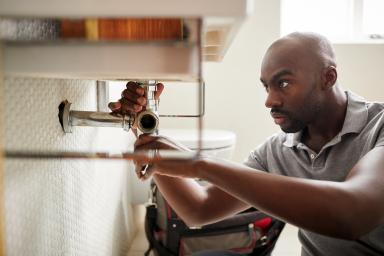How to set up an office
Increase your productivity with a well-designed office set up.
Whether you're setting up an office from scratch or simply implementing a few changes to an existing one, our tips on how to set up an office can help.
Check office legal requirements
Before you alter your office layout, check for any legal requirements that restrict what you can do.
Common problems include needing to get planning permission for significant work, or restrictions placed on what you can add or change.
If you employ five or more staff for example, you'll need to implement a Health and Safety policy, ensuring that sufficient space, adequate toilet facilities, fire precautions, first aid equipment and adequate ventilation exist for your employees.
Assign an office refurbishment budget
Don't be tempted to skimp on your office budget - a poorly set up office can harm productivity and effectiveness.
Spend as much as you can afford in decent-quality office furniture, and look for reliable brands for printers and computers that are less likely to break down.
Know your office IT and furniture needs
Start by making a list of the office furniture and IT equipment that you need, dividing it into essential, priority and nice-to-have lists.
Don't be tempted to spend money on items with lower priority before ticking off essential items.
After desks and chairs, you'll need to factor in installing a wi-fi network with broadband internet access - along with buying computers and items such as a multi-function printer.
Buying last year's models can offer significant savings if you don't need the latest features.
Decide on the layout of your office
Each business has different layout needs.
If you're a medium-sized business with more than ten employees, you may prefer the 'island' approach where desks are grouped in twos or fours facing each other, to encourage discussion and communication and easily share screens.
Alternatively, the 'assembly line' approach, where desks are arranged in rows or a line, creates a quiet working environment.
Avoid overcrowding and potential health hazards by allocating clear pathways for your employees to move safely round the office.
Buy furniture and IT equipment for your office
Office furniture can be expensive - medium-sized business can benefit from bulk buying discounts.
Don't skimp on cheap office furniture, especially chairs.
If your business means your employees will be sitting down at desks for long periods of time, invest in supportive chairs to avoid back injury.
It may also be worth purchasing armrests to avoid wrist pain.
Consider whether your staff will be using laptops or desktop PCs.
Laptops allow for smaller cheaper desks, as you don't need space for keyboards, monitors, mice or mouse mats.
Laptops also allow for hot-desking.
This removes the need to assign each staff member their own desk as employees simply use their laptop on whatever desk is free - perfect if many of your employees spend time out of the office meeting clients or customers.
Buying an all-in-one printer, scanner and fax machine will save money and space.
If you rarely fax and scan, consider buying a black and white printer, and outsource faxing and scanning through online services.
Purchase filing cabinets, baskets, shelves and cupboards to avoid clutter and keep paperwork organised. You could also purchase a secure, off-site storage unit, to safely store important documents that you don't need in the office.
Learn with Start Up Loans and help get your business off the ground
Thinking of starting a business? Check out our free online courses in partnership with the Open University on being an entrepreneur.
Our free Learn with Start Up Loans courses include:
- Entrepreneurship – from ideas to reality
- First steps in innovation and entrepreneurship
- Entrepreneurial impressions – reflection
Plus free courses on climate and sustainability, teamwork, entrepreneurship, mental health and wellbeing.
Disclaimer: The Start -Up Loans Company makes reasonable efforts to keep the content of this article up to date, but we do not guarantee or warrant (implied or otherwise) that it is current, accurate or complete. This article is intended for general information purposes only and does not constitute advice of any kind, including legal, financial, tax or other professional advice. You should always seek professional or specialist advice or support before doing anything on the basis of the content of this article.
The Start-Up Loans Company is not liable for any loss or damage (foreseeable or not) that may come from relying on this article, whether as a result of our negligence, breach of contract or otherwise. “Loss” includes (but is not limited to) any direct, indirect or consequential loss, loss of income, revenue, benefits, profits, opportunity, anticipated savings, or data. We do not exclude liability for any liability which cannot be excluded or limited under English law. Reference to any person, organisation, business, or event does not constitute an endorsement or recommendation from The Start-Up Loans Company, its parent company British Business Bank plc, or the UK Government.
Your previously read articles
Sign up for our newsletter
Just add your details to receive updates and news from Start Up Loans
Sign up to our newsletter


